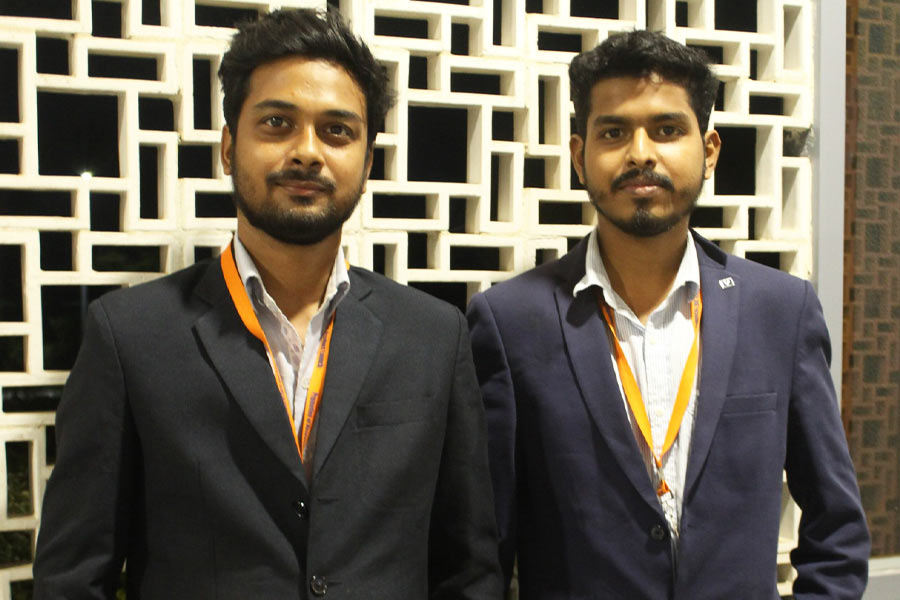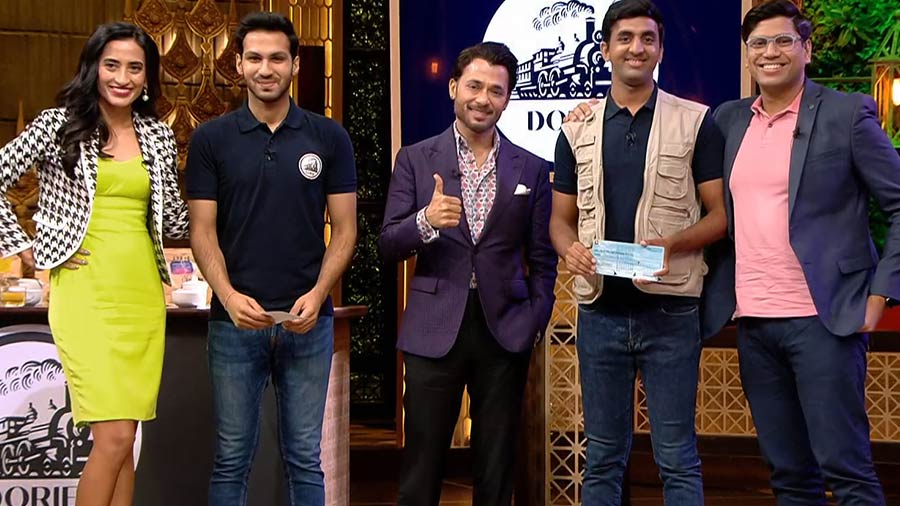If you’ve been following the latest season of Shark Tank India, you have probably heard of Matri. Spearheaded by Roni Mondal and Rohan Roy, this menstrual pain relief device became an instant hit on the show, receiving offers from all five sharks, with Aman Gupta and Namita Thapar finally stepping in as investors. As Matri prepares for its launch, My Kolkata spoke to Roni and Rohan about their journey from the bylanes of Howrah to the biggest platform for Indian entrepreneurship.
The duo met each other for the first time at Howrah Zilla School, where they found a common interest in electronics. From the start, both Rohan and Roni enjoyed tinkering with hardware and making things from scratch. Their first major innovation was in Class 11, where they made a solar-chargeable power bank. Upon developing a home automation device, they noticed a unique trend. “We uploaded our finished projects on social media, and people started reaching out to us, asking if they could buy it. We realised that what we were doing was useful and held value for people,” says Rohan.
This began a cycle of innovation. The two would develop a product, and sell it if it was well received. They would then invest this capital into developing a new product. “We sold our first home automation device for Rs 5,000, and went on to install it in 15 homes, where they are still in use today,” adds Roni.
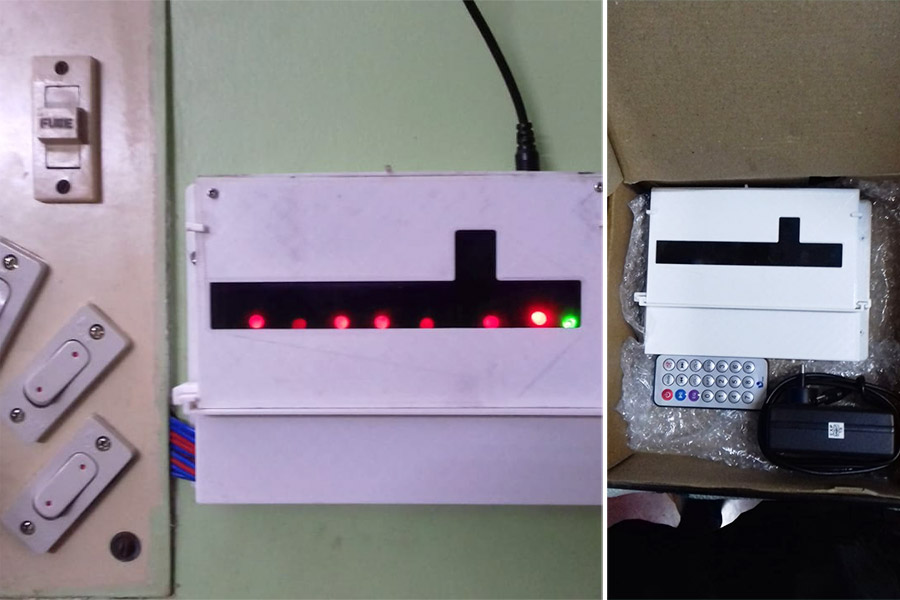
Rohan and Roni’s first innovation — a home automation device
After school, Rohan went to study instrumentation engineering at RCC Institute of Information Technology, while Roni enrolled in the electrical engineering programme at Camellia Institute of Technology. During this time, they set up Boitoi, an online platform for selling books, and learnt a lot about running a business and selling to consumers. This cemented their desire in setting up a venture that would impact people’s lives, and the two constantly brainstormed over what their next project should be. They began making a list of the daily problems in their family, and wondering if they were being shared by others too. This is when they focussed on menstrual pain.
“Within our own homes, Rohan’s mother and my sister, both have endured excruciating pain during their periods. Research showed us that most women either use a hot water bag, which can’t be taken everywhere, or pop painkillers, which have side effects. We realised that there was a huge scope in finding a global solution through electronics,” said Roni.
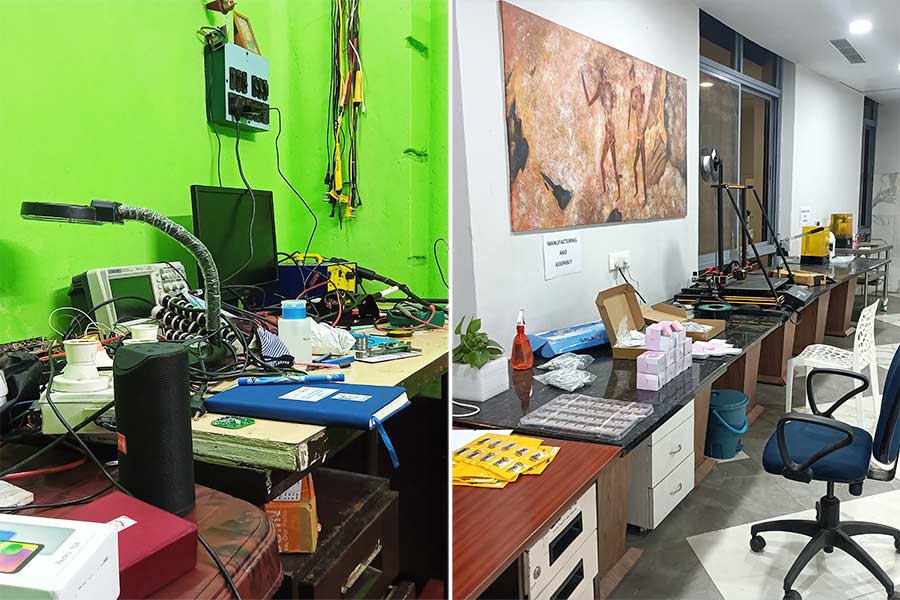
(Left) During Covid, they set up an electronics lab in Howrah; (right) they recently set up a bigger manufacturing plant in Patna
Rohan and Roni started by consulting with the best psychologists in Kolkata, and researching pain management. This brought them to the Gate Control theory of Pain, which they felt could be used with electronics to find a solution to menstrual pain. “In 2018, whilst still in college, we pitched our first prototype to IIT Patna. They offered us lab support, without any financial backing. We would go to their lab 2-3 times a month to develop the product,” reminisces Rohan.
But the lab could only help them so much. In order to make progress, they needed capital. The core of entrepreneurship is said to be problem-solving. Rohan and Roni proved themselves by finding a unique solution to the lack of funding. “We would purchase the apparatus for LED bulbs from Chandni Market, and every night, after college, both of us would assemble 25 bulbs each, to sell them the next day,” reminisced Roni.
Through this, the duo managed to gather enough capital to create three more prototype devices over the next two years. “We would hand them out to women in our homes and paras, to get feedback and efficacy from real women. After incorporating their responses and rectifying the device’s flaws, we finally had a ready prototype to show IIT Patna in 2020,” says Rohan. This time, the institute didn’t just offer them lab access, but also financial support and mentorship. With the company being formally incorporated, Rohan and Roni were on a roll — when Covid struck. Unable to work at IIT, they weren’t deterred in the slightest. “We set up a small lab in Howrah, which houses all the modern machinery an electronics lab requires. All our R&D has been done here,” smiles Roni.
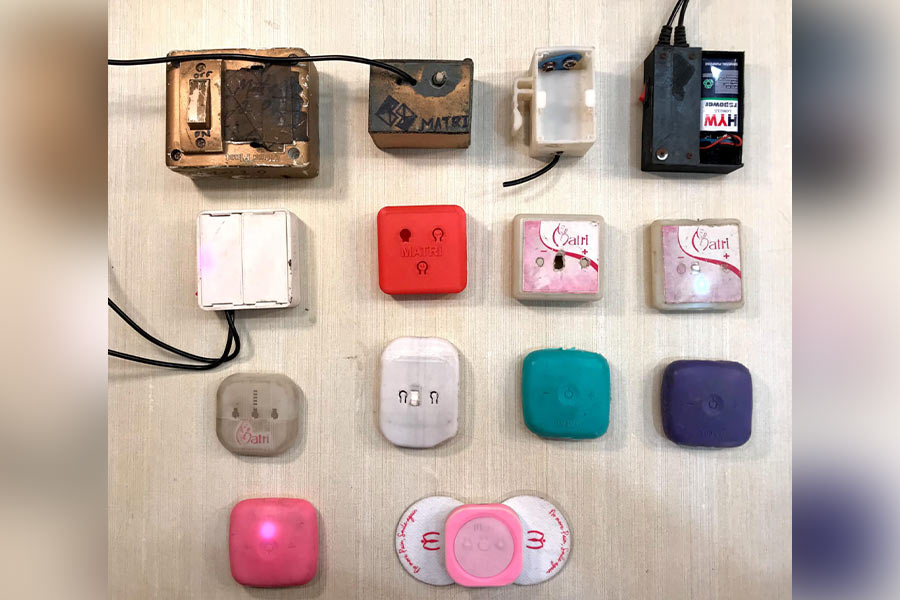
The Matri device had 14 prototypes before becoming a finished product
Over the next two years, the technology significantly advanced with each prototype. By Roni and Rohan’s own admission, ‘the first iteration was very basic’. With user feedback, they added a display, safety features, and pain intensity regulation, while maintaining all the standards and regulations set by the government. “We take safety very seriously. During the trials, when we heard that a lot of people had fallen asleep while wearing them, we developed a system where it would automatically shut down after 20 minutes of inactivity. We also developed a single port, so that the device can’t be used while charging,” adds Rohan.
After working closely with IIT Patna till 2022, they finalised the device after its 14th prototype. Their next challenge was commercialisation, for which they moved to Bangalore for a year to harness the benefits of its start-up ecosystem. They found support from DERBI Foundation, who helped them secure funding from the Ministry of Electronics and Information Technology, and the Department of Science and Technology.
Shark Tank India was more of a coincidence than a plan. Last October, Rohan and Roni were just exploring opportunities when they filled up the online form for the show. What followed was a comprehensive screening process by the team at Sony TV, where Team Matri explained their idea and sent a video of their product. After clearing three rounds, they were called to Mumbai for an audition. “We returned without expecting anything to come of it. But in December, we got a call to come for the final round,” grins Roni.
Things weren’t smooth sailing in the tank either. Being Howrah-bred Bengalis, Rohan and Roni spoke Hindi quite differently than the demands of Shark Tank, and confessed to making mistakes in every single rehearsal before the main shoot. Never having faced a camera added to their nerves. “Everything apart from the 100 second introduction is unscripted. Our pitch lasted for an hour, and we faced a constant tussle between focusing on our Hindi and our numbers! Honestly, matha kaaj korchilo na (our minds weren’t working), but somehow, everything flowed perfectly in the tank,” beamed Rohan.
Their hard work paid off in the tank, where all five sharks competed to invest in Matri at their desired valuation. While Shaadi.com CEO Anupam Mittal gave them the title of ‘Padman 2.0’, OYO CEO Ritesh Agarwal even offered them a higher valuation (Rs 1 crore for 4% equity) than their original ask, which was Rs 60 lakh for 4% equity. Finally, Rohan and Roni sealed the deal with Aman Gupta and Namita Thapar at their original ask, just as they had hoped to. “Before the pitch, we knew we wanted to bring Namita ma’am for her pharma background, and Aman sir for his expertise in the D2C sector. However, we had never expected to get an offer from all sharks, that too at a higher valuation than the original one,” adds Roni.
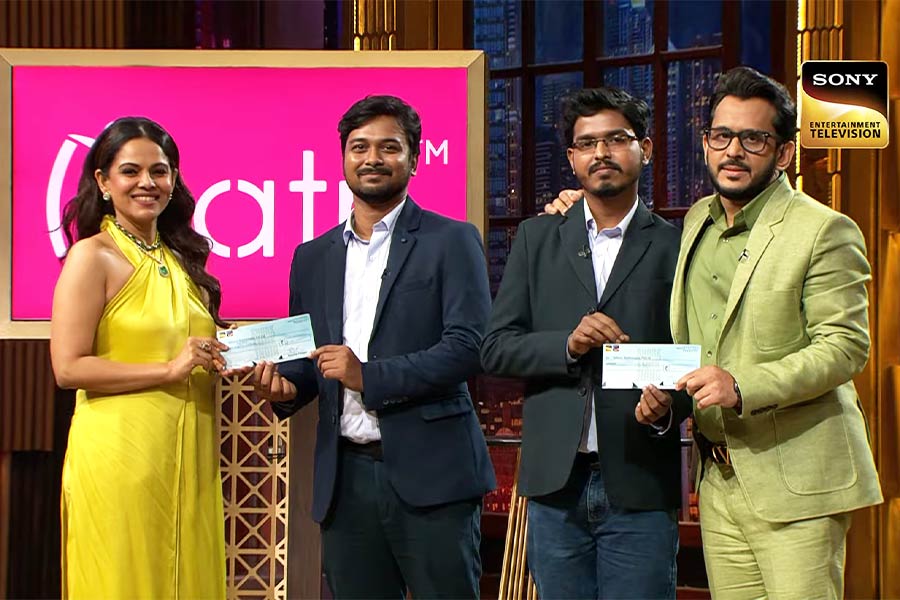
Roni and Rohan’s vision was appreciated by Namita Thapar and Aman Gupta
Since the episode aired earlier this month, the duo have been getting more than 200 calls every day from potential investors, customers, and even gynaecologists. Their following on social media has also soared, with each LinkedIn post generating lakhs of views, and their Instagram going from 200 to 12,000 followers. The timing couldn’t have been better, as they intend to introduce the product into the market on April 10, by shipping the first 1,000 batches. “As two male co-founders of a female-centric product, we were initially apprehensive about how people would respond, but the support has really encouraged us. Earlier we used to struggle with pitching, but now, every conversation we have with a stranger on the road, bus or train is an opportunity to pitch,” confesses Roni. They are already accepting pre-orders for their second batch on their website, www.getmatri.com, which will be shipped on April 30.
Rohan and Roni are now in the process of onboarding more investors, and have begun manufacturing at a 1,000 sq ft space in IIT Patna, which also houses their medical lab. While they will be working from Patna for a year, they do hope to eventually operate the business from their hometown, and set up a manufacturing hub in Kolkata. “We have suffered due to a lack of ecosystem, and the last six years have taught us a lot. We want to establish ourselves and bring these learnings to Kolkata, so that the city’s brimming talent has the right ecosystem,” Rohan said.
While they have big dreams for their city, currently, they are completely committed to the problem at hand. Nothing is bigger than the cause.
“After college, we both received placement offers, but didn’t take it up because we believed in Matri. Now, even those who work with us have added to our zeal. We are associated with over 40 gynaecologists. Our technical head even left TCS to join us. Every day, we work with the same vision: to alleviate pain for every woman. We want every woman to carry Matri in their bag,” signed off Roni.
